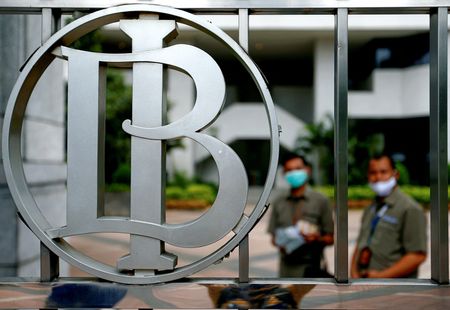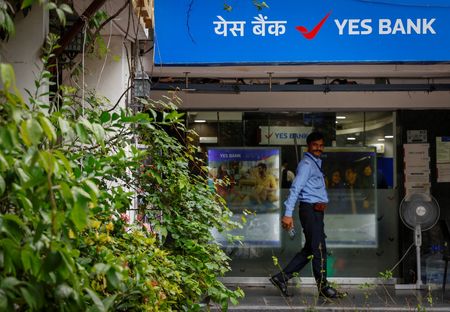By Gayatri Suroyo and Stefanno Sulaiman
JAKARTA (Reuters) – Indonesia’s central bank delivered another surprise interest rate cut on Wednesday, aiming to bolster economic growth even as investors’ concerns grow over the country’s fiscal discipline.
Bank Indonesia trimmed the benchmark 7-day reverse repurchase rate by 25 basis points to 4.75%, its sixth cut since it kicked off an easing cycle in September last year and taking borrowing costs to the lowest since late 2022.
All 31 economists surveyed by Reuters had expected no change after a cut in July and an unexpected easing in August.
Governor Perry Warjiyo said the central bank would continue to assess room for further cuts, underscoring economists’ expectations for more monetary loosening. BI has had to balance the need to keep the rupiah currency stable while supporting economic growth during the easing cycle, Warjiyo said.
“Our economic growth is still below the national capacity so demand needs to be pushed,” Warjiyo told an online press conference, adding BI has been going “all out” to support economic growth while maintaining financial market stability.
Indonesia’s stock market hit a record high after Wednesday’s decision, while the rupiah firmed slightly.
The rupiah is one of emerging Asia’s worst performing currencies so far this year. It has dropped 2% against the U.S. dollar, with concerns over Indonesia’s domestic finances and central bank independence offsetting broader global weakness in the greenback that has buoyed many other emerging market currencies.
Financial markets also have been unsettled by two weeks of protests and unrest in many cities from late August, and by last week’s abrupt sacking of respected finance minister Sri Mulyani Indrawati.
There have been concerns about the central bank’s independence following a “burden sharing” deal that will see BI help fund state programmes.
Parliament is discussing changes to an existing bill that could strengthen the requirement of the central bank to support growth and also give it the power to recommend the removal of the bank’s governor, lawmakers said on Tuesday.
BI has now cut its main interest rate by a total of 150 basis points in this cycle, and has expanded liquidity through its open market operations and government bond purchases in the secondary market.
The bank also cut its overnight deposit facility rate by 50 bps and its lending facility rate by 25 bps to 3.75% and 5.50%, respectively.
SIGNS OF SLOWDOWN
Southeast Asia’s largest economy grew 5.1% in the second quarter from a year earlier, the fastest pace in two years, but new Finance Minister Purbaya Yudhi Sadewa has said there were signs of slowing in the third quarter.
Purbaya has criticised BI for keeping banking liquidity “dry”, which has restricted bank lending, as he moved more than $12 billion of government funds from the central bank to commercial banks to be used for loans.
In an apparent response, Warjiyo said liquidity was ample but demand for credit has been weak as businesses were in a wait-and-see mode. Banks have approved lending commitments worth 2,372 trillion rupiah ($144.41 billion) that have not been utilised, he said.
Warjiyo also urged commercial banks to follow BI’s lead in cutting rates, highlighting that their lending rates have fallen only 7 bps so far this year, a small fraction of the cuts in the central bank’s major rates.
However, Warjiyo said he welcomed Purbaya’s decision to move government funds and the new $1 billion stimulus package for the fourth quarter, which he said could help bolster domestic demand.
“Policymakers likely bet on a re-widening in the ID-U.S. rate differential after the U.S. Federal Reserve’s anticipated cut this week, providing more headroom to lower domestic rates in the fourth quarter,” DBS economist Radhika Rao said, adding markets were monitoring potential changes to BI’s mandate.
Gareth Leather, an economist with consultancy Capital Economics, said the surprise cut was likely to heighten concerns about BI’s independence, while Warjiyo’s dovish tone suggests further easing is coming.
“That said, the government and central bank’s clear pivot towards growth-supportive measures risks undermining confidence in policymaking,” Leather said, warning any resulting adverse market reaction could force BI to reconsider its dovish stance.
Local lender Bank Permata revised its forecast for the end-2025 benchmark rate to 4.50%, from 4.75% before, with more cuts expected in 2026, its economist Faisal Rachman said.
The governor did not respond to questions on parliament’s bill affecting BI.
($1 = 16,425.0000 rupiah)
(Reporting by Gayatri Suroyo, Stefanno Sulaiman and Fransiska Nangoy; Additional reporting Sameer Manekar in Bengaluru; by Editing by John Mair, Jacqueline Wong anda Kim Coghill)











